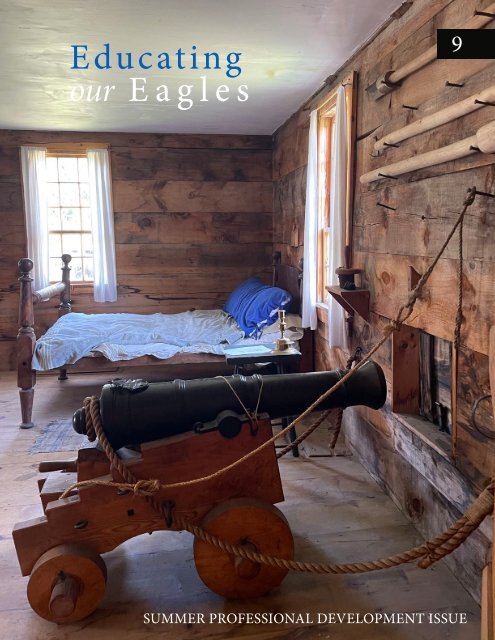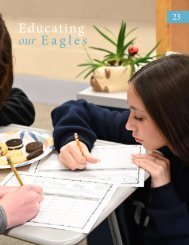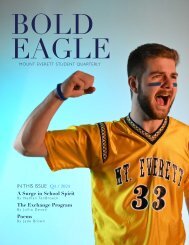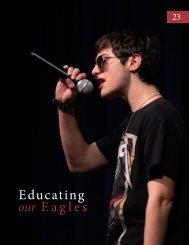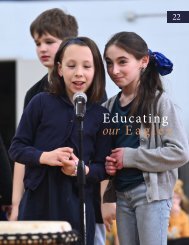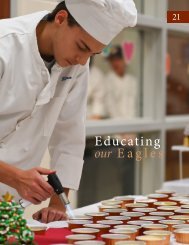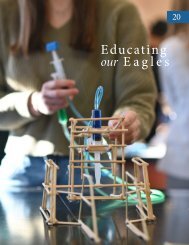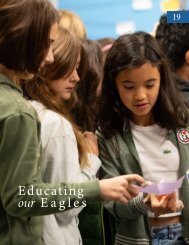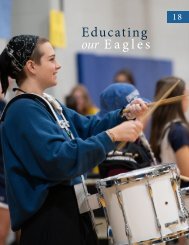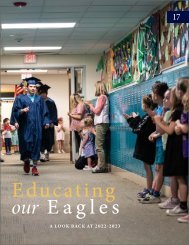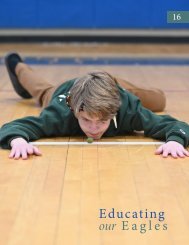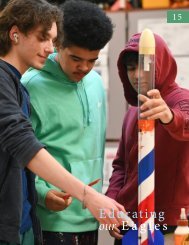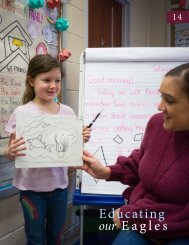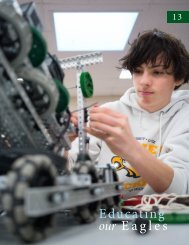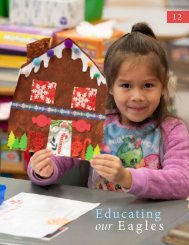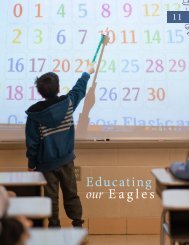Educating Our Eagles - Issue Nine
Summer 2022 Curriculum and Professional Development Edition
Summer 2022 Curriculum and Professional Development Edition
You also want an ePaper? Increase the reach of your titles
YUMPU automatically turns print PDFs into web optimized ePapers that Google loves.
<strong>Educating</strong><br />
our <strong>Eagles</strong><br />
9<br />
SUMMER PROFESSIONAL DEVELOPMENT ISSUE
From SBRSD’s Director of Curriculum and Instruction, Julie Dolan<br />
Welcome Back!<br />
We are pleased to be starting the second year of our publication, <strong>Educating</strong> <strong>Our</strong><br />
<strong>Eagles</strong>! This was created to give families and community members a lens into our<br />
classrooms. However, it occurred to us that many people are not aware of all the work<br />
and continuing education our teachers do each summer. So, this issue is going to<br />
focus on all the amazing opportunities teachers participated in over the summer.<br />
<strong>Our</strong> future issues will focus on all the wonderful things happening in our schools.<br />
We continue to see growth in our math scores because of our new math program and<br />
we are currently looking at new reading programs for the Elementary Schools. We<br />
implemented a new reading program in middle school at the beginning of the year<br />
that offers many supports to help us better meet the needs of all students. In other<br />
exciting news, the Elementary Schools are going to be starting a Community Read<br />
Aloud Program this year. This will bring community members into classrooms four<br />
times a year to read to the students and gift the book read to the class. We are pleased<br />
to have the opportunity to allow people into our buildings again.<br />
We are thrilled to announce the start of our Early College program with Bard College<br />
at Simon’s Rock. This collaboration was made possible through a grant from the state.<br />
After many years and countless hours of applying for the grant Mt. Everett was given<br />
this award, a grant to support the implementation of a wall-to-wall Early College High<br />
School. This means that all students at Mt. Everett will be exposed to college classes<br />
and have the opportunity to graduate from high school with up to 30 transferable<br />
college credit hours. These college credits will be earned in conjunction with the High<br />
School graduation requirements at no cost to our families.<br />
Please be looking in your mail for a newsletter that will be coming from the School<br />
Committee that will talk about these programs and many others.<br />
Here’s to a great school year!<br />
CONTENTS<br />
National Endowment for the Humanities: LANDMARK SERIES - pages 4-12<br />
Additional Summer work - pages 13-14<br />
Cover: Mount Everett middle school students participated in team-building exercises during their first Field Day.<br />
Right: Mr. Wolgemuth participated in a summer National Endowment for the Humanities workshop.<br />
2 EDUCATING OUR EAGLES
EDUCATING OUR EAGLES<br />
3
NEH LANDMARK SERIES<br />
This summer I participated in the NEH Landmarks series:<br />
Living on the Edge of Empire: Alliance, Conflict, and<br />
Captivity in Colonial New England which took place in<br />
Deerfield, MA. Each day different scholars and experts<br />
presented lectures and workshops from multiple perspectives:<br />
settler, indigenous, and scientific. There was a wealth of<br />
new information that I was able to cross-reference with<br />
local research regarding the Mohican People. So much was<br />
intriguing to me, especially regarding intertribal relationships<br />
pre and post contact as well as colonial alliances. The learning<br />
is currently being applied to a county-wide collaborative arts<br />
integration project, which will be unveiled on Indigenous<br />
Peoples' Day in October.<br />
STEPHANIE GRAHAM<br />
EDUCATING OUR EAGLES<br />
4
EDUCATING OUR EAGLES<br />
5
NEH LANDMARK SERIES<br />
This summer, Mount Everett English teacher Kevin Wolgemuth<br />
participated in a two-week Institute run by the National<br />
Endowment for the Humanities. Under the direction of professors,<br />
experts and Indigenous community leaders from throughout New<br />
England, twenty K-12 educators from across the country examined<br />
historical documents, maps, oral traditions and artifacts through<br />
several perspectives including archaeological, cultural, literary,<br />
topographical/geographical and political. Focusing particularly<br />
on Mourt's Relation, an obscure 1622 English collection of<br />
writings recounting the early years at Plymouth, teachers engaged<br />
in extensive close readings and discussions toward decolonizing<br />
historical narratives. Tours included visits to Mayflower II,<br />
Plymouth, Provincetown and local areas to "walk the steps" and<br />
first encounters of Indigenous peoples and English settlers.<br />
KEVIN WOLGEMUTH<br />
EDUCATING OUR EAGLES<br />
6
EDUCATING OUR EAGLES<br />
7
NEH LANMARK SERIES<br />
This summer I was lucky enough to join colleagues from all over the country in<br />
Deerfield, MA for a NEH sponsored weeklong workshop Living on the Edge of<br />
the Empire. This was an intensive and immersive program located at the Deerfield<br />
Teacher’s Center of the Pocumtuck Valley Memorial Association. Throughout the week<br />
we explored the time surrounding the 1704 Raid on Deerfield. We explored the many<br />
narratives that came from the unique experience of the raid. We discussed how the<br />
agreements between the Abnaki and Mohawk tribes were understood by both parties in<br />
diverse ways. The French settlers from Canada knew this and formed an alliance with<br />
the Abnaki, Mohawk, and Huron tribes. This led to the surprise raid in February of that<br />
year and when the settlers were captured their lives often changed forever.<br />
During the workshop I was able to design a lesson that explored origin stories from<br />
tribes throughout North America. The unit is launched by learning about how the<br />
Pioneer River valley is explained through Abnaki legend. Students then explore the<br />
landforms surrounding our area and connect to the many tribes that still exist in<br />
North America. <strong>Our</strong> class will also be joining many schools in Berkshire County in the<br />
Hexagon Project, through Stepanie Graham, where students are creating artwork that<br />
will illustrate the idea of connection.<br />
This workshop was a fantastic way to connect with colleagues throughout the country.<br />
Being able to develop friendships and connections with teachers across the country is a<br />
fantastic way to enrich our own schools and I am grateful I was able to be a part of the<br />
program.<br />
JANE SCHUR<br />
EDUCATING OUR EAGLES<br />
8
EDUCATING OUR EAGLES<br />
9
NEH LANMARK SERIES<br />
Joanne Duval (Resource room 7/8) completed a two-week special development<br />
workshop funded by the National Endowment for the Humanities. The institute,<br />
“Pandemics in History, Literature and Today” featured an interdisciplinary team of<br />
University of Arkansas professors, medical, and community experts who worked with<br />
participants on the 1918 influenza pandemic to consider how to integrate these lessons<br />
into history, science, and literature curricula. We learned about the history of the 1918<br />
flu, read novels, discussed poetry, and examined artwork and music. Additionally, we<br />
were led through exercises on contagion, disease transfer, and virology using interactive<br />
teaching. Participants examined oral histories of COVID collected by the University of<br />
Arkansas and finally spent time at the Pryor Center learning how to create oral history<br />
projects with students and develop grade-appropriate historical and interdisciplinary<br />
lesson plans. After hours, we stayed in University of Arkansas housing and explored the<br />
Northwest Arkansas Region- from Crystal Bridge Art Museum, the Cherokee Nations,<br />
and the wide choice of food offerings!<br />
JOANNE DUVAL<br />
EDUCATING OUR EAGLES<br />
10
EDUCATING OUR EAGLES<br />
11
SUMMER WORK<br />
Elyse Mercier (Mt. Everett Special Education)<br />
completed a class called Foundations of<br />
Restorative Practices which starts her work<br />
towards a graduate certificate in Restorative<br />
Practices through the Internation Institute<br />
for Restorative Practices. The course focused<br />
on the foundations of restorative practices<br />
as an evolving field of study, explored the<br />
emotional, relational, and ecological theories<br />
underpinning restorative principles, and<br />
the importance of engaging with others in<br />
equity-oriented relationships.<br />
Kari Giordano (Mt. Everett Art) completed<br />
a course called Photographic Sustainable<br />
Strategies through Falmouth University.<br />
The course focused on the methods and<br />
approaches we use to produce photographic<br />
work and how we carry those out responsibly<br />
for a shared future.<br />
Victoria Aldam (Mt. Everett English)<br />
completed a Masters of English through<br />
Southern New Hampshire University. The<br />
program focused on both creative and<br />
communication skills and covered a myriad<br />
of historic and contemporary topics in<br />
literature. The program culminated in a<br />
thesis paper that Victoria wrote about how<br />
Shakespeare used his feminine characters as<br />
catalysts throughout each of his three famous<br />
tragedies: Hamlet, Othello and Macbeth.<br />
Sarah Cooke (South Egremont School)<br />
earned a Certificate of Advanced Graduate<br />
Study with MCLA this summer.<br />
Neal Barbieri (Mt. Everett Mathematics)<br />
completed a graduate course called<br />
Mathematical Modelling for Educators<br />
through MCLA. The course was designed<br />
for K-12 educators who are already<br />
teaching mathematics but want to support<br />
their pedagogy by incorporating real-life<br />
mathematical modelling projects. The course<br />
explored the tools necessary to create and<br />
adapt modelling projects, keeping in mind<br />
the current best practices in assessment and<br />
transparency, with a focus on writing and<br />
coding in mathematics.<br />
Ashley Barrett (UME Third Grade)<br />
completed a course called CORE's Reading<br />
Fundamentals training through the Mass<br />
Literacy: Open Access Professional Learning<br />
(OAPL) initiative. The course focused on<br />
the foundational concepts of the science of<br />
reading for all grade levels, covering the early<br />
grade basics as well as adolescent literacy and<br />
high-leverage intervention topics.<br />
Tanya Michaud attended a weeklong EPI<br />
(Ecology Project International) course, in<br />
the Greater Yellowstone Ecosystem. Science<br />
educators from all over the U.S. came<br />
together to work with researchers to learn<br />
about the conservation efforts made for<br />
local amphibians, buffalo, pronghorns, and<br />
wolf populations. We created NGSS-aligned<br />
lessons using the 5E Learning Cycle model.<br />
More importantly, we had the opportunity<br />
to put on waders and survey ponds for<br />
amphibian life, walk within proximity of the<br />
buffalo, and hear the wolves howl and the<br />
baby elk bellow!<br />
Mr. Maier took the secondary MTEL exam<br />
to qualify for Massachusetts State Teacher<br />
Certification and passed it, even though,<br />
through no fault of his own, he wasn’t given<br />
sufficient time to complete the exam!<br />
Elizabeth Petty (Music) completed two<br />
courses over the summer focusing on English<br />
Language Learners and Visual-Spatial<br />
Learners.<br />
EDUCATING OUR EAGLES<br />
12
EDUCATING OUR EAGLES<br />
13


